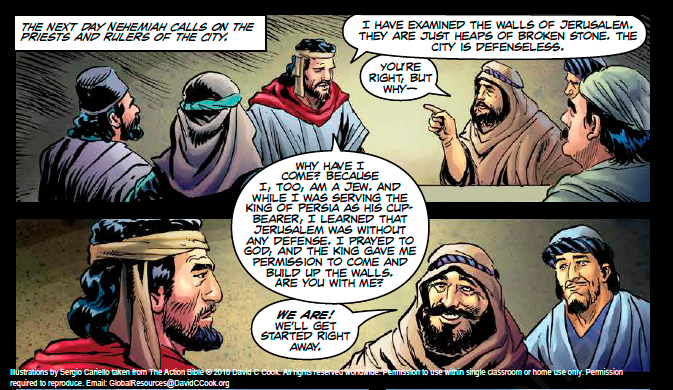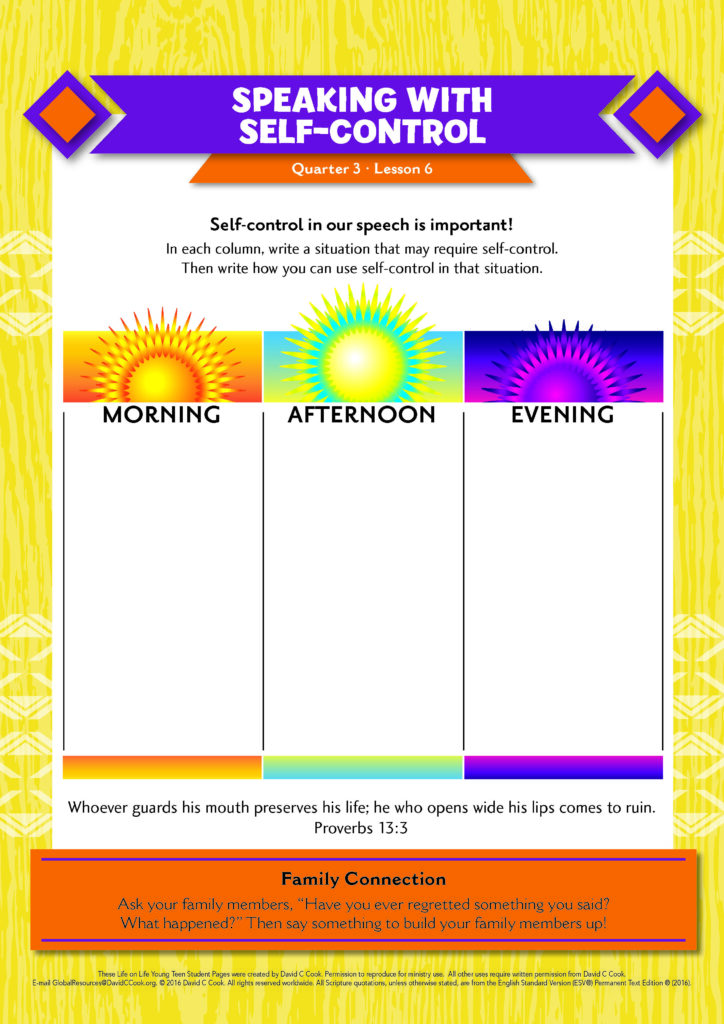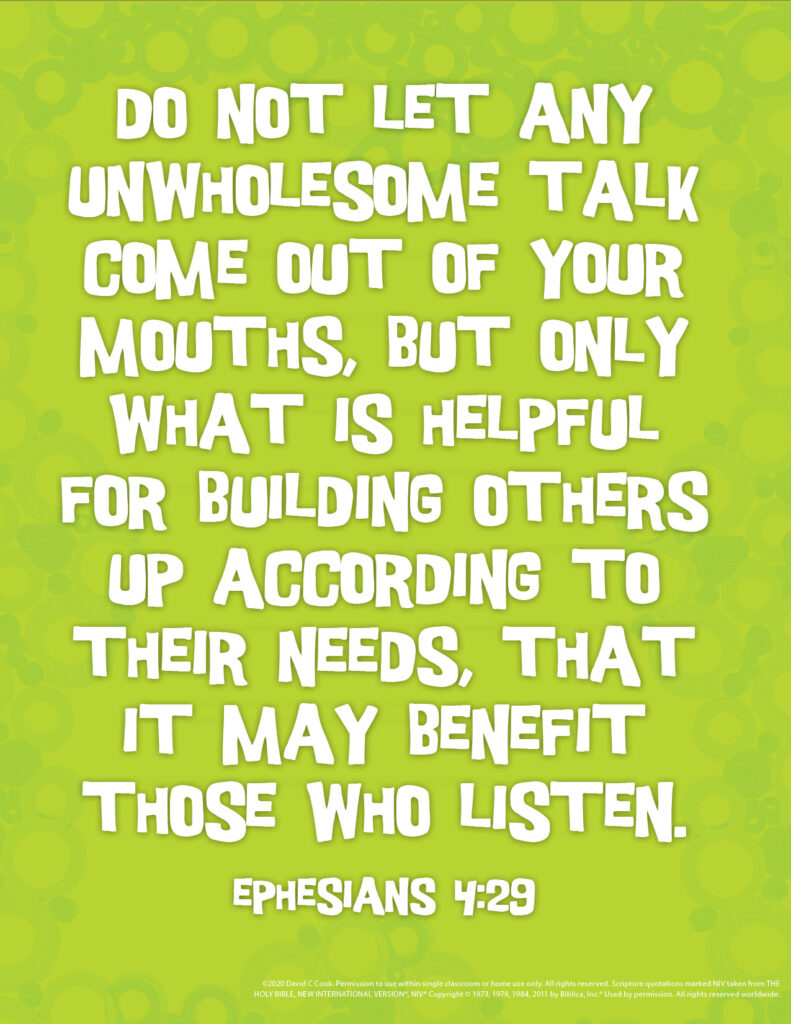During the lesson, the information for you to know is written in regular type, and what we suggest speaking or reading aloud to children is in bold. All resources for this lesson, including the Teacher Guide, Student Page, Family Connection Card, and other resources can be downloaded in a ZIP file by clicking on the following link:
In some lessons you will find "resource articles." These are articles written by experts from around the world to help equip you for your work with children and adolescents. Share them with parents or guardians if you consider it appropriate.
The tongue has the power of life and death, and those who love it will eat its fruit.
Proverbs 18:21
Words have the power to destroy and the power to heal. Think of a specific time in your life when another person’s words hurt you. How did the hurtful words make you feel about yourself? Do you still feel the pain of those words? You can give your pain to God. He will comfort you.
Now think of a time when someone said words of encouragement, affirmation, love, or gratitude to you. How did these words affect you? How did God use them to help you heal or grow? Spend a few moments praising God for those life-giving words. Ask Him to fill you with His truth and give you self- control in your speech. Ask Him to help you to be a good model for your students of one who speaks with self-control.
Encourage the students to ask family members,”When was a time you regretted something you said? What happened?” Then they can say something to build their family members up!
Teacher Tip: If possible, email or text the Family Connection Card to the families of your students.
Greet your students warmly as they arrive. Have them stand in a big circle. Ask 2 student volunteers to stand in the middle of the circle. Identify 1 as “clay” and 1 as “sculptor.” They should be the same gender, either both boys or both girls.
Our 2 volunteers represent “clay” and a “sculptor.” I will whisper a sentence to the sculptor, and he will shape the clay to show how someone would look in that situation. When the sculptor is done, the rest of the group will try to guess what emotion the clay is feeling. For example, if I whisper, “I am very happy that you are in this class,” the sculptor might shape the clay by pulling that person’s lips into a smile.
The sculptor cannot talk while he is sculpting the clay. The person acting as the clay must try to stay in the position the sculptor puts her in as though she were a statue.
Whisper to the sculptor,“You are the most wonderful person I know!”The sculptor might make the clay smile and stand proudly. Ask the sculptor to step back so the group can see the result.
Allow 2–3 students to share their thoughts. They may answer that the clay looks excited or happy.
Allow the group to guess. Once they have finished guessing, allow the sculptor to reveal the statement.
Thank the sculptor and the clay. Then ask for 2 different volunteers of the same gender to repeat the activity. This time, whisper to the sculptor, “You are alone and will never have any friends.” The sculptor might have the clay frown and look down at the floor. After the sculptor is done, allow the class to see the clay.
Allow 2–3 students to share their thoughts. They may answer that the clay looks scared or sad.
Allow the group to guess. Then allow the sculptor to reveal the statement.
Ask the students to quickly find partners. Have them discuss the following questions with their partners. Then allow 2–3 pairs to share what they discussed with the class.
Our words are powerful. We can use them to help and encourage others. When we use our words wisely, we can help others to feel confident and loved. We can lead others toward God. That is what our words are meant to do.
If we do not control our words, they can damage and destroy other people. At times when we are angry, hurt, afraid, or careless, we may speak without thinking. These kinds of words can hurt others. Words said in anger, frustration, or bitterness can end friendships or cause others to make poor choices. They can bring pain to other people—sometimes even for the rest of their lives!
Today we will hear a Bible story about a man named Nehemiah. Before this story took place, God’s people, the Jews, lived in the country of Judah. Many of them lived in the capital city of Jerusalem. For the Jewish people, Jerusalem was a holy place—God’s great city for His people. The city was protected on all sides by tall, wide walls. But the armies of Babylon had broken down the walls and taken many of the Jewish people as captives.
About 150 years later, a Jewish man named Nehemiah was grieved because Jerusalem’s walls were still in ruins. He prayed and asked God to make a way for him to go to Jerusalem to rebuild the walls.
But Nehemiah served the king of Persia, so he could not leave without the king’s permission. He was afraid to talk to the king, but he prayed and asked God for help. Then Nehemiah told the king about the ruined walls of Jerusalem, and the king allowed Nehemiah to go to Jerusalem. The king even sent some of his soldiers with Nehemiah to protect him on the journey. Nehemiah knew that God would give him and the Jewish people strength to rebuild the walls.
Show the Action Bible image of Nehemiah inspecting the walls if possible.

When Nehemiah arrived in Jerusalem, he inspected the walls. Then he spoke with the leaders there, encouraging them to help with the rebuilding of the walls. Listen to what he said to the leaders.
Ask a student to read Nehemiah 2:17–18 aloud from the Bible.
Show the Action Bible image of Nehemiah encouraging the leaders.
Then I said to them, “You see the trouble we are in: Jerusalem lies in ruins, and its gates have been burned with fire. Come, let us rebuild the wall of Jerusalem, and we will no longer be in disgrace.” I also told them about the gracious hand of my God on me and what the king had said to me. They replied, “Let us start rebuilding.” So they began this good work.
Nehemiah 2:17–18

Because of Nehemiah’s encouragement, the leaders were motivated to work together to rebuild the walls.
Allow students to share their thoughts.
Ask another student to read Nehemiah 2:19 aloud from the Bible.
But when Sanballat the Horonite, Tobiah the Ammonite official and Geshem the Arab heard about it, they mocked and ridiculed us. “What is this you are doing?” they asked. “Are you rebelling against the king?”
Nehemiah 2:19
They used words to discourage Nehemiah and the Jewish people from rebuilding the walls.
Students may answer that they would have become angry, told them to leave, or argued with them.
Let’s read the rest of the story.
Ask a student to read Nehemiah 2:20 aloud from the Bible.
I answered them by saying, “The God of heaven will give us success. We his servants will start rebuilding, but as for you, you have no share in Jerusalem or any claim or historic right to it.”
Nehemiah 2:20
Nehemiah chose self-control. He remained calm and did not react in anger. Instead, he spoke with confidence. He told the men who ridiculed him that the people of Jerusalem would rebuild the walls and that God would make them successful. And Nehemiah was right! With God’s help, they rebuilt the walls and restored the city!
Students might answer that Nehemiah could have done something in his anger that he would have regretted. He could have hurt someone or been killed. If Nehemiah had reacted in anger, he definitely would not have brought glory to God.
When someone says or does something that makes us angry or afraid, we can react by letting our emotions take control—or we can ask God to help us speak with self-control. Throughout this story, Nehemiah prayed about everything. He trusted God with everything. He did not know if God wanted him to return to Jerusalem, so he prayed. He was afraid to talk to the king, so he prayed. He trusted God with every situation and every decision. As a result, God filled Nehemiah with wisdom and self-control. When Nehemiah was ridiculed and mocked by people who did not want him to be successful in what God had called him to do, Nehemiah responded with truth rather than anger.
If possible, share a time when someone’s negative words kept you from doing something God wanted you to do. As you share your own life and mistakes, your students will feel more comfortable sharing theirs.
All of us need to continually bring our self-control issues to God. We often speak before we think about how our words will make others feel. We all know how it feels to hear hurtful or terrible words from others. God wants to help us have self-control so we do not hurt others.
Let’s read a verse from the Bible that talks about speaking with self-control.
Ask a student to read Proverbs 13:3 aloud from the Bible.
Those who guard their lips preserve their lives, but those who speak rashly will come to ruin.
Proverbs 13:3
Point out 3 different areas of your teaching space. The first area represents morning, the second represents afternoon, and the third represents evening. Ask the students to select an area and go stand in that area.
In your groups, talk about a difficult situation you might face at that time of day in which you will have to use self-control when you speak. For example, your father yells at you and your sister in the morning when you leave for school. What could you do or say to exercise self-control?
Allow 4–5 minutes for the students to share with the others in their areas. Then ask each group to share what they discussed with the rest of the students.
Optional: Give each student a piece of paper and a pencil. Have them fold the paper into three equal sections. They can label the top of each section with 1 of these words: Morning, Afternoon, Evening. They can each write a situation in which they need to respond with self-control at each time of day. Then they can pray together as a group.
If you are using the Student Pages, the students can use these pages for the activity.

You can see from these situations that exercising self-control with our speech can help us to be safe and avoid doing things we regret. We can respond to these difficult situations by showing our anger, frustration, or fear. Or we can show wisdom and self-control in our speech and say things that encourage peace instead of conflict. Self-control can also help us to choose kindness in our speech.
Ask a student to read Ephesians 4:29 aloud from the Bible.
Do not let any unwholesome talk come out of your mouths, but only what is helpful for building others up according to their needs, that it may benefit those who listen.
Ephesians 4:29

It means to encourage, affirm, bless, or compliment someone.
Words are powerful! We can use them to hurt others, or we can use them to build others up. We have a choice about what to say. We can say unkind words that destroy. Or we can choose words that show kindness and self-control—words that build others up. God wants us to use our words to help others instead of tearing them down. We can ask God for wisdom and self-control in our speech at all times of the day.
Close your time with this blessing based on Ephesians 4:29.
Blessing: May God’s love overflow onto others through the words you speak. May He empower you to respond to others with wisdom and self-control so that your words show kindness and patience and build others up.
Lead the students in singing this quarter’s song if possible.
Life on Life ©2020 David C Cook. Reproducible for home or classroom use only. All other uses require written permission from David C Cook [email protected]. All rights reserved.